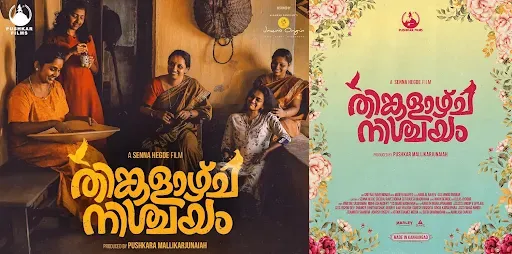Thinkalazhcha Nishchayam goes inside the family and watches it closely. The movie sets the plot in Kanhangad, Kasaragod. The Malayalam dialect with the influence of Kannada is used effectively in the movie. Senna Hegde is the director of the movie.
Thinkalazhcha Nishchayam Movie Poster
Movie Review: 'Thinkalazhcha Nishchayam' a comedy-drama with a peripheral reproval to undemocratic situations in conservative families
The marriage ceremony is a special day, especially when people are close to cultural celebrations. At the same time with social expectations, may turn into a burden. Thinkalazhcha Nischayam (Engagement on Monday) tries to tell the emotional situations inside a conservative family on the previous day of engagement. The movie sets the plot in Kanhangad, Kasaragod. The Malayalam dialect with the influence of Kannada is used effectively in the movie. Senna Hegde is the director of the movie. The screenplay was written by the director himself with Sreeraj Raveendran. Manoj K U plays Vijayan, Ajisha Prabhakaran as Lalitha, Anagha Narayanan as Suja, and Unnimaya Nalappadam as Surabhi. Thinkalazhcha Nishchayam won the Kerala State award for second best film and best story.
Thinkalazhcha Nishchayam goes inside the family and watches it closely. The movie grows through the emotional drama within a family. Which was ruled by a patriarchal father named Vijayan. An eccentric man, who thinks he is the King in the sovereign family or trying to be. Returned from Kuwait and lives a middle-class life, in terms of financial situations. He tries to suppress the interests of his wife and two daughters. The marriage of the first daughter Surabhi goes against his interest due to situations. Now it’s the turn of the second daughter, Suja. And there is a conflict between the interest of the father and daughter.
In a simple way, fascism can be defined as forcing one interest on other. Imposing one’s right on the other. This can be seen in micro-level individual relationships. The father Vijayan is a fascist in his world view, as a representative of the patriarchal society. He even supports the Autocracy over democracy as an administration tool. By upholding Kuwait's rule over Indian democracy. It was clearly mentioned and countered. The importance of democracy in a family is the central point of discussion here.
But it is not an attempt to criticize the male-dominated society. The mother is projected as a submissive character. Who waits for the permission of the husband to do everything. And also romanticize their relationship. The continuation of this macho ruling can be seen in the relationship between next-generation Suja and Rajesh. By imploring for eloping. The same can see in Surabhi’s life.
The character of Girish, played by Rajesh Madhavan, his thin body is being commodified all over the film. Even in the first part of the movie a character is mocked for his thin body. The attempt to create a funny character in this entire drama was an element of cliche.
A comedy-drama. The movie takes a side with Suja. And criticizes family expectations and points its burden on youngsters. But it is not an in-depth criticism of male-female relationships in marriage or male domination inside the families. But just telling a situation. Which is a bit against the conservative attitude, but only a peripheral approach.
Review by Jobin V. Mammen






